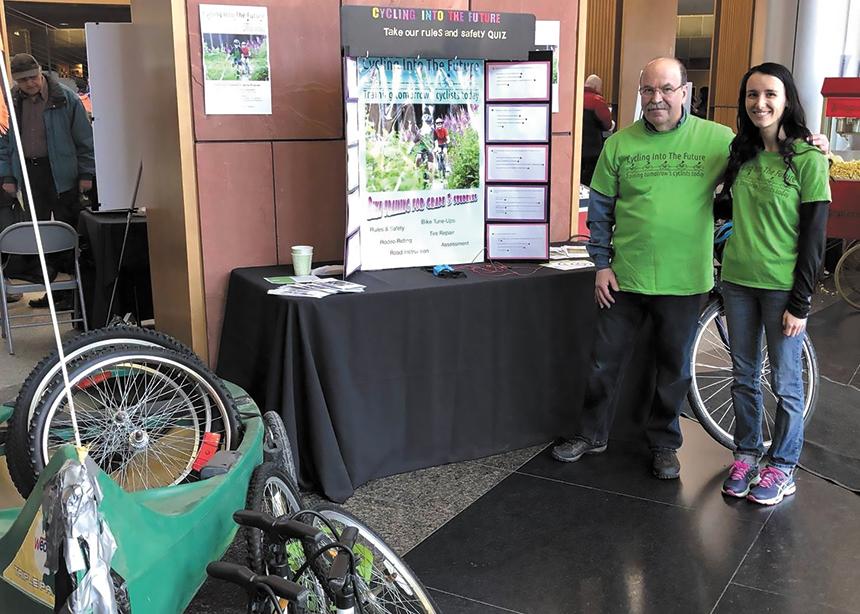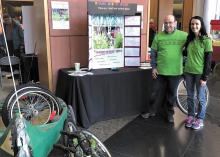When Philip Martin discovered several years ago that “cycling education in Canada is almost non-existent,” he set out to do something about it.
With the help of his students at Sheppard Public School in Kitchener, Ont., he designed a program that would fill the gap. It was those students who pushed him to make the cycling training comprehensive and authentic, with on-road experience and evaluation at the end. They assured him that children would take it more seriously.
So the now-retired teacher, who is a member of Breslau (Ont.) Mennonite Church, founded Cycling into the Future, which enables children to become safe, confident, life-long cyclists, while caring for the earth in the process. He also serves as its current board chair.
The non-profit organization began when Martin’s class decided to complete the remaining 3,000 kilometres of Terry Fox’s Marathon of Hope from Thunder Bay to Victoria, B.C. They tracked the distances they ran around their schoolyard, but they got discouraged by how long it was taking. One student suggested they could do more if they were allowed to bring their bikes.
Martin agreed but was dismayed to witness a near accident between a student cyclist and a car on the school’s busy street. Realizing that most children receive no instruction in how to cycle safely, he engaged his Grade 5 students to help design the bike-safety program that became Cycling into the Future.
Six local schools participated in the first year. Now, five years later, 1,500 Grade 5 students in Waterloo Region were trained. Over its short history, the program has trained more than 5,000 children to cycle safely in traffic and taught 200 more how to ride a bike. The goal is for all 6,000 Grade 5 students in Waterloo Region to participate by 2024.
The comprehensive training program offers six modules over three days, “designed to teach kids how to safely and confidently operate and own a bike.” It begins with an interactive classroom session on rules and road safety. Then, under the supervision of trained instructors, students learn how to maintain their bikes and repair a flat tire. They go through a schoolyard riding rodeo so they can practise safety skills before going through a 75-minute, on-road session in small groups with a riding instructor. The program is embedded into the health and physical education curriculum, so teachers assess student achievement at the end.
At the heart of the program’s philosophy is its covenant of inclusion. Children who don’t have a bike or helmet will get them to keep at no cost, and those who have never ridden a bike will learn how to ride. Efforts are made to accommodate children with special needs.
Reflecting on this core commitment, Martin notes that “receiving a bike is a powerful thing for kids.” It provides fun, improves health, expands their world and represents growing independence, while being good for the earth. “The meaning of cycling for kids is profound,” he says.
Ella Strathdee, who worked for Cycling into the Future as a student and now volunteers, was recruited at Breslau Mennonite by Martin, to help with the program. She is part of a team of 40 people, including a full-time executive director, and many young adults and retirees—some paid and some volunteer—teaching cycling and maintenance skills, tuning up bikes and doing administrative tasks. Her passion for physical fitness, hands-on learning and working with children made her a natural fit. She reflects on how rewarding it is to see the joy and exuberance when children learn to ride for the first time, and parents witness their success. She adds that it feels good to make a difference in the safety of so many children.
For Strathdee and Martin, being part of the program is an expression of their faith. Martin describes creation care as one of the most important ethical issues of the day. His theological foundations of God as creator and people as earth-keepers ground his work. He says that getting children cycling outdoors inspires greater appreciation for the natural world, even in the city, and gives them a tangible way to care for the Earth.
Strathdee describes how being part of the program deepens her sense of gratitude, especially when she sees how much it means for children whose families can’t afford bikes to get one for the first time.
The program nurtures strong partnerships in the cycling community and with business, education, charitable and government sectors. Beyond expanding to all schools in Waterloo Region, Cycling into the Future sees other opportunities to grow by partnering with summer camp programs, or businesses whose employers encourage healthy, active living for their employees.
Martin’s passion for creation care, cycling education and authentic learning continues to inspire a new generation of confident, safe, earth-keeping cyclists.





Comments
I'm giving this article to my grandchildren here in B.C. to read.
Add new comment
Canadian Mennonite invites comments and encourages constructive discussion about our content. Actual full names (first and last) are required. Comments are moderated and may be edited. They will not appear online until approved and will be posted during business hours. Some comments may be reproduced in print.